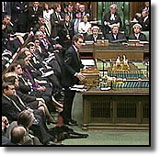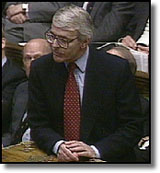
|
|
Blair's First New-Look Question TimeTony Blair has taken his first Question Time session as Prime Minister, ushering in a new era of extended 30-minute exchanges.The experiment, which replaces two 15-minute weekly sessions, left Mr Blair contented and hopeful of an end to some of the cruder clashes that have marked Question Time in the past. But there was criticism from the Conservatives, with claims that the new system does not add to accountability. Others said simply that it was dull. The Liberal Democrat leader Paddy Ashdown hailed a breakthrough for his larger parliamentary party. He is guaranteed two questions each week, one more than under the previous system and there is more scope for his MPs to ask questions too. The session, moved to midweek after years of Tuesday and Thursday exchanges, saw Mr Blair field 24 questions from 20 MPs. Labour had claimed that the new approach would mean more questions and the figure on day one compared favourably with the previous average of nine MPs asking an average of 10.4 questions per 15-minute session.
In a clear bid to demonstrate his confidence at the dispatch-box, Mr Blair responded to questions ranging from issues such as the windfall tax to crime and drugs to Northern Ireland, landmine exports and the minimum wage without the trademark, bulky Prime Ministerial file containing briefing notes on all subjects. The Conservative party leader John Major limited himself to three linked questions. Under the new system, the leader of the opposition has the right to ask more than three but fewer than six questions. The Tory chairman Brian Mawhinney attacked the reformed system. "The Prime Minister promised that his reforms to Question Time would mean more information for the public. The reality was nothing of the sort," he said. "All we had was a rehash of his General Election cliches in response to orchestrated tame questions from Labour MPs. He did not give a credible answer to any Conservative question," said Mr Mawhinney. "This is not a change for the better or for the benefit of Parliament. It has everything to do with trying to shield the Prime Minister from public accountability," he added.
|
Diana, Princess of Wales, 1961-1997
Conference 97
Devolution
The Archive
News |
Issues |
Background |
Parties |
Analysis |
TV/Radio/Web
Interactive |
Forum |
Live |
About This Site
News |
Issues |
Background |
Parties |
Analysis |
TV/Radio/Web
Interactive |
Forum |
Live |
About This Site
© BBC 1997 |
politics97@bbc.co.uk |

